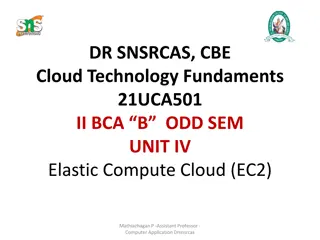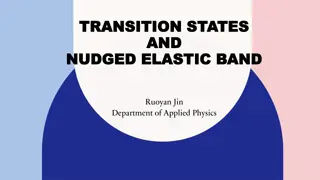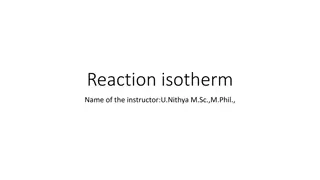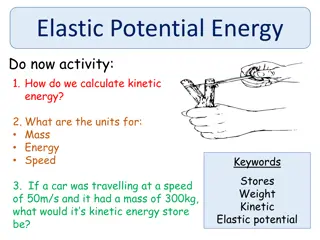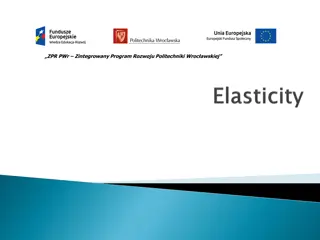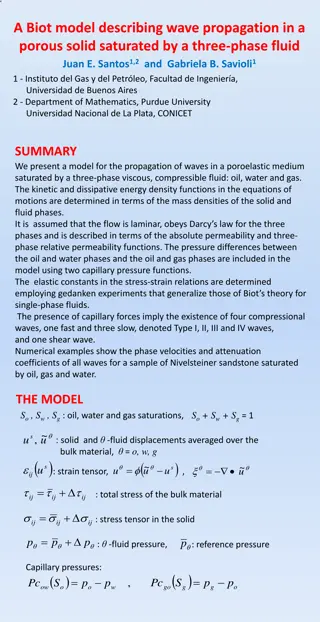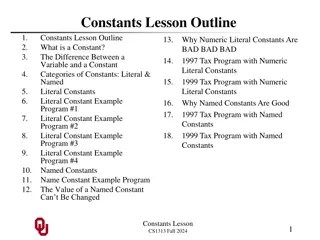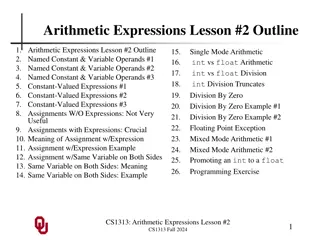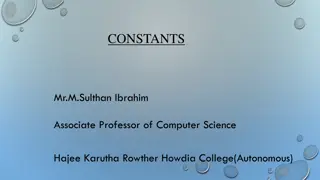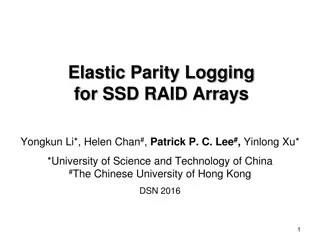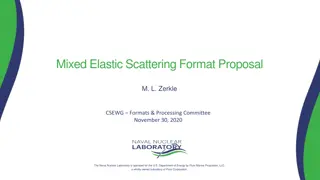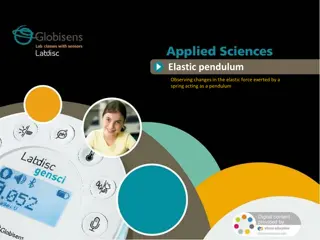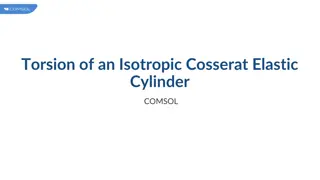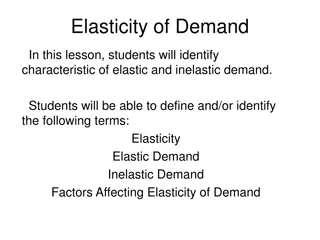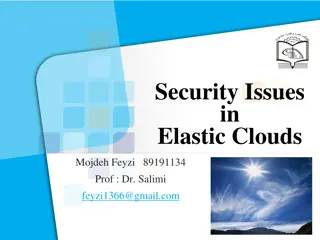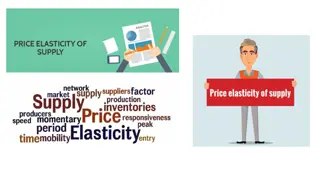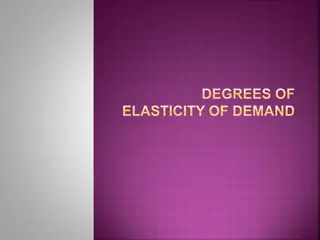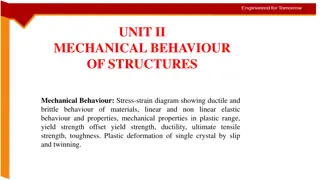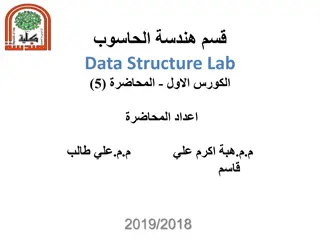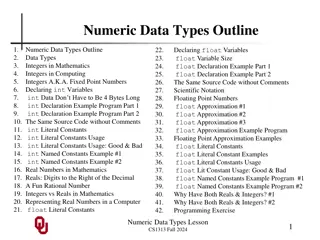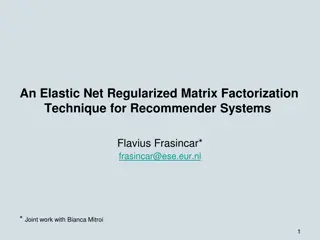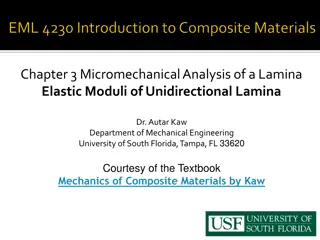Amazon EC2: Elastic Compute Cloud Fundamentals
Amazon Elastic Compute Cloud (EC2) is a web service provided by Amazon Web Services (AWS) that offers resizable compute capacity in the cloud. EC2 allows users to rent virtual servers known as instances to run applications. Key features include various instance types, Amazon Machine Images (AMIs), s
11 views • 5 slides
Programming in C: Overview and Constants Explanation
Programming in C is a fundamental introductory guide to the C programming language. It covers the basics of C, including its development history, character set, constants, and rules for constructing constants like integer and real constants. Dr. M. A. JAMAL MOHAMED YASEEN ZUBEIR, an Assistant Profes
4 views • 33 slides
Transition States and Nudged Elastic Band in Applied Physics
Description of transition states, potential energy surfaces, saddle points, minimum energy paths, and the Nudged Elastic Band method in the context of applied physics. The content explains key concepts such as transition states along reaction coordinates, the significance of potential energy surface
0 views • 9 slides
Reaction Isotherms and Equilibrium Constants
Explore reaction isotherms and equilibrium constants through Vant Hoff's and Gibbs free energy equations. Learn about the relationship between Gibbs free energy, equilibrium constant, and temperature dependence. Discover how these concepts are applied in determining the direction of chemical reactio
2 views • 18 slides
Assembler Directives and Symbols in Assembly Language
Assembly language is a low-level programming language used for computers, microprocessors, microcontrollers, and ICs. It consists of instructions and directives (pseudo instructions). Assembler directives are statements that guide the assembler during the assembly process. Categories of directives i
4 views • 39 slides
Elastic Potential Energy Concepts
Explore the concepts of elastic potential energy, kinetic energy calculations, storing energy, and rearranging equations with practical examples and self-assessment tasks to deepen your understanding of the topic.
0 views • 11 slides
Algebraic Expressions: Variables, Coefficients, and Constants
Explore the difference between numeric and algebraic expressions, learn about the components of algebraic expressions - variables, coefficients, and constants. Discover how to identify variables, coefficients, and constants in expressions. Classify algebraic expressions as monomials, binomials, or t
0 views • 20 slides
Lattice Constants in Materials Using DFT Calculations
Using Density Functional Theory (DFT) calculations, we explore how to determine the lattice constant of simple cubic, face-centered cubic (fcc), and hexagonal close-packed (hcp) materials. By fitting numerical data and analyzing energy considerations, we predict lattice constants for various metal s
1 views • 17 slides
Insights on Price Elasticity of Demand and Consumer Behavior
Understanding the concept of price elasticity of demand, this content explores how changes in price affect consumers' buying behavior. It covers the Veblen effect, Giffen goods, Marshall's example on staple foods, and the responsiveness of demand to price fluctuations. The content also explains elas
6 views • 31 slides
Introduction to Floating Point Data Types and Operations
This content delves into the fundamentals of floating-point data types, focusing on single-precision floating-point formats like float, excess-127, and their characteristics. It also compares float and int32_t data types, detailing the representation and conversion of values between them. The materi
1 views • 46 slides
Model for Wave Propagation in Poroelastic Medium Saturated by Three-Phase Fluid
We introduce a model describing wave propagation in a porous solid saturated by a three-phase fluid (oil, water, and gas). The model considers kinetic and dissipative energy density functions, laminar flow obeying Darcy's law, and capillary pressure functions. Elastic constants are determined using
1 views • 4 slides
Chemistry Review Exercise: Periodic Table and Atomic Properties Review
This detailed content covers a review exercise on the Periodic Table and Atomic Properties of various elements. It includes information on atomic structures, fundamental physical constants, and common elements found in the Periodic Table. The content explores elements from Hydrogen to Osmium, detail
0 views • 16 slides
Constants in Programming
Constants in programming are values that remain fixed throughout the execution of a program, unlike variables whose values can change. This lesson outline covers the definition of constants, the difference between variables and constants, categories of constants (literal and named), examples of lite
0 views • 18 slides
Java Programming Concepts: Data, Loops, Variables, and Scope
This content discusses fundamental Java programming concepts such as primitive data types, definite loops, constants, scope, limitations of variables, and scope implications. It also covers the use of class constants to create fixed values visible throughout a Java program.
0 views • 15 slides
Arithmetic Expressions and Constants in Programming
Learn about the importance of named constants and variables in arithmetic expressions, how to perform assignments with and without expressions, and the implications of working with integer and floating-point arithmetic in programming. Explore examples and exercises to enhance your programming skills
0 views • 26 slides
Different Types of Constants in Programming
Constants in programming are fixed values that do not change during program execution. They include character, numerical, and string constants. Integer constants can be decimal, octal, or hexadecimal. This article explains each type of constant with examples of decimal, octal, and hexadecimal intege
0 views • 22 slides
Overview of Special Connective Tissue: Cartilage - Histology by Dr. Ammar Ismail
Cartilage is a specialized connective tissue with chondrocytes in lacunae, lacking vasculature and nerves. Hyaline cartilage is common in the body, while elastic cartilage contains elastic fibers, and fibrocartilage is associated with dense connective tissue. Cartilage growth occurs through chondroc
0 views • 20 slides
Elastic Parity Logging for SSD RAID Arrays
SSDs are widely used for their performance and efficiency, but face challenges like flash errors and poor random write performance. The paper introduces EPLog, a new RAID design for SSD arrays, enhancing reliability, endurance, and performance through elastic parity logging. The solution redirects w
0 views • 23 slides
Impulse Excitation Technique for Monitoring Green Ceramics During Firing
The Impulse Excitation Technique (IET) is a nondestructive testing method employed to monitor the elastic properties of green ceramics as they undergo firing processes. This technique allows for the analysis of phase changes and material behavior at high temperatures, providing valuable insights int
0 views • 6 slides
Experimental Setup at IP5 for Inelastic Events and Particle Detection
Experimental setup at IP5 involves inelastic telescopes for charged particle detection and vertex reconstruction. The setup includes T1 and T2 telescopes, HF and CASTOR detectors, as well as Roman Pots for measuring elastic and diffractive protons. The TOTEM experiment focuses on proton-proton inter
0 views • 27 slides
Mixed Elastic Scattering Format Proposal
This proposal focuses on introducing a Mixed Elastic Scattering format to address the need for a more rigorous treatment of thermal elastic scattering effects in selected nuclides. The format extension, compatible with ENDF-6, supports advanced moderator development without impacting existing TSL ev
0 views • 6 slides
Elastic Pendulum: Observing Changes in Spring Forces
In this activity, students analyze variations in the periodicity of the elastic force of a spring acting as a pendulum. The objective is to estimate approximate values for pendulum and elastic oscillation periods and establish a relation between them. The theory explains the behavior of oscillatory
0 views • 21 slides
Elastic Potential Energy and Energy Conservation Principles
Elastic potential energy is stored in elastic bodies like springs and is vital in understanding energy conservation principles. This energy can be calculated using the work done by an ideal spring on a block. By applying elastic potential energy concepts, one can analyze scenarios where a spring sys
0 views • 9 slides
Analysis of Torsion in Isotropic Cosserat Elastic Cylinder using COMSOL
Explore the extension of linear elastic material model to a Cosserat material, including microrotation degrees of freedom, with a focus on a cylindrical bar under pure torsion. Investigate the impact of Cosserat length scale parameter on the system response, analyzing different zones of behavior. Re
0 views • 8 slides
Elasticity of Demand and Factors Affecting It
Identify the characteristics of elastic and inelastic demand, define terms like Elasticity, Elastic Demand, and Inelastic Demand. Explore why we still buy gas despite rising prices, the concept of elastic and inelastic demand using examples like pants and apple juice. Learn about factors influencing
0 views • 16 slides
Elastic Execution with CloneCloud: Enhancing Mobile Applications
The CloneCloud system introduces elastic execution capabilities, enabling the seamless offloading of resource-intensive tasks from mobile devices to the cloud. Byung-Gon Chun, Mayur Naik, Sunghwan Ihm, Petros Maniatis, and Ashwin Patti present a flexible architecture that optimizes application perfo
0 views • 28 slides
Challenges and Solutions in Elastic Cloud Security
Elastic clouds bring benefits like rapid scalability, but also pose security challenges. These include issues with data storage, processing, virtual networks, and overall cloud security. Key challenges involve multi-tenancy, data mobility, and privacy. Solutions entail easy deployment, secure key ma
0 views • 22 slides
Investigation of Spin Observables in Elastic pp and p(bar)p Scattering at SPASCHARM Program
Measurements of spin observables in elastic pp and p(bar)p scattering at 16 GeV will be conducted at the SPASCHARM program using a unique setup with polarized proton and antiproton beams. The experiment aims to extend the energy range for spin studies and compare elastic scattering in pp and p(bar)p
0 views • 24 slides
Price Elasticity of Supply in Economics
Price elasticity of supply measures how much the quantity supplied responds to changes in price. It can be inelastic (quantity supplied responds slightly), elastic (quantity supplied responds substantially), or unit-elastic (price elasticity of supply equals 1). Various determinants like the passage
0 views • 16 slides
Degrees of Elasticity of Demand
Elasticity of demand refers to the responsiveness of quantity demanded to changes in price. Perfectly elastic demand occurs when there is an infinite demand at a particular price and demand becomes zero with a slight rise in price. Conversely, perfectly inelastic demand occurs when there is no chang
0 views • 11 slides
Mechanical Behavior of Structures: Stress-Strain Diagrams and Elastic Properties
Understanding the mechanical behavior of structures involves analyzing stress-strain diagrams, distinguishing between ductile and brittle materials, exploring linear and non-linear elastic properties, studying plastic deformation, yield strength, ultimate tensile strength, and toughness. Elastic beh
0 views • 32 slides
Enhancing Scrub Seal Emulsions for Asphalt Mix Rejuvenation
Activities of the Spray Group involve developing effective materials specifications for scrub seal emulsions with rejuvenators to properly rejuvenate cracked asphalt mixes. The purpose is to ensure successful applications with the most effective products. Consideration of elastic polymers, non-elast
0 views • 4 slides
Precipitation Reactions in Analytical Chemistry
Precipitation reactions play a crucial role in analytical chemistry, where cations and anions combine to form insoluble solids called precipitates. By following solubility rules, scientists can predict these reactions, aiding in identifying ions present in solutions. Properties, formation, and equil
0 views • 17 slides
Elastic Security Virtualization with vNIDS
Explore the concept of Elastic Security through Safe and Efficient Virtualization of Network Intrusion Detection Systems using vNIDS. This study delves into the challenges of traditional NIDSes, the requirements for virtualized environments, traffic volume variations, new trends in network function
0 views • 36 slides
Constants and Literals in C++ Programming
Constants and literals in C++ are fixed values that the program cannot alter. They come in various types such as integer numerals, floating-point numerals, characters, strings, and boolean values. Integer literals can be decimal, octal, or hexadecimal constants, while floating-point literals have in
0 views • 7 slides
Numeric Data Types in Programming
Exploring the world of numeric data types, this content delves into the concepts of integers and real numbers in mathematics as well as their representation in computing. It covers the use of literal constants, named constants, and the differences between integers and real numbers. The content also
0 views • 42 slides
Plant Constants in Construction Engineering
This academic piece delves into the significance of plant constants in building and civil engineering construction projects. It discusses the necessity of accurate quotes, reliable quantities, and standards for labor and plant to achieve efficiency and cost-effectiveness. The content emphasizes the
0 views • 19 slides
Elastic Net Regularized Matrix Factorization for Recommender Systems
This research paper presents an elastic net regularized matrix factorization technique for recommender systems, focusing on reducing the dimensionality of the problem and utilizing features to describe item characteristics and user preferences. The approach combines existing algorithms and applies e
0 views • 27 slides
Acid-Base Disorders and Blood Gas Analysis
This educational content provides definitions, formulas, and explanations related to acid-base disorders, blood gas analysis, dissociation constants, the Henderson-Hasselbalch equation, and carbonic acid in clinical pathology. Learn about acids, bases, pH, ionization constants, and how these concept
0 views • 35 slides
Micromechanical Analysis of Lamina Elastic Moduli in Composite Materials
Micromechanical analysis of lamina elastic moduli in composite materials, focusing on properties like longitudinal elastic modulus, transverse elastic modulus, Poisson's ratio, and in-plane shear modulus. It explains how to calculate the longitudinal Young’s modulus for a unidirectional lamina and
0 views • 42 slides
